How I study undergraduate in Canada

0. Introduction
Hello, dear readers Habr!
This post is a continuation of my story about getting a bachelor's degree in Canada . I am extremely pleased with the fact that the picture at the beginning of the article is my own, and not borrowed from google.com.
A little more than two weeks have passed since the beginning of my studies and I am ready to share with you my first impressions, some subtleties of studying and living, interesting facts.
A relatively large amount of text I again divide into parts. Enjoy reading!
(Attention! There are a lot of pictures under the cut!)
')
1. Arrival to Vancouver and first impressions
Of course, I am very sorry, but I have never flown on intercontinental airplanes, and therefore this hulk, on which I flew, became a whole event in my life.
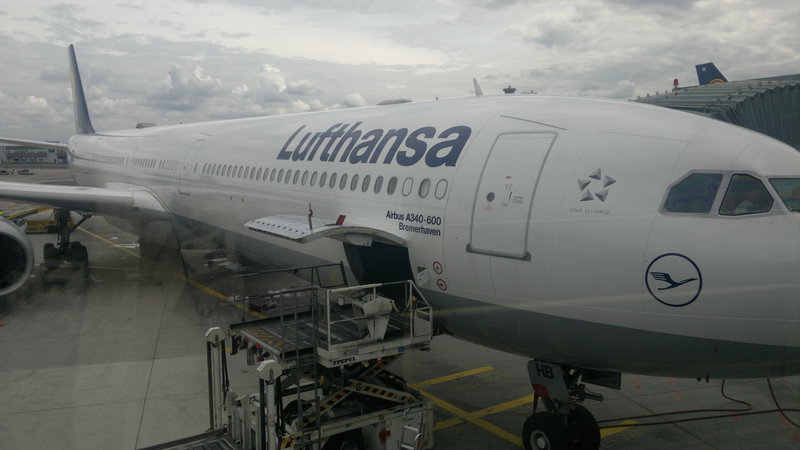
At about noon on August 31, I was already at the airport in Vancouver. Having strayed a little, I went to the necessary passport control desk, where I was stamped in my passport and sent to the migration control zone. Nothing terrible, of course, happened there, but the migration officers here are just enormous. It seems that one of the requirements of the profession - to be a bodybuilder. I calmly answered a couple of questions about the purpose of the visit (study at UBC), extended an official letter of enrollment to the university (which, by the way, was not returned to me) and, without haste, received my Study Permit until 2016. I also have a visa until 2016.
Since you can only enter the hostel after 12:00 on September 1, I spent the night in a hotel in downtown Vancouver. So, from the airport I still needed to get there. The transportation system here is awesome. No queues at the subway! You just get on the train! The only "but" is the line on which it says "Do not cross without payment." All stations have ticket machines. You insert a bill, a coin or a bank card, and you get a ticket. Very comfortably. But, oddly enough, my card, tied to an account in US dollars, did not work. Machines accept only Canadian dollars. I had to go to the airport and change my cash dollars to Canadian. In the end, I bought a ticket and calmly drove to my hotel.
And what if I do not buy a ticket? Nobody checks the tickets! Although, I was told that sometimes the metro worker was standing and checking the tickets. If you get caught without a ticket, you will have to pay a fine of about $ 123. For your information, the subway in Vancouver is not cheap. All stations are divided into 3 zones and so simply the border between them can not slip. Cross a zone - pay more (I paid about $ 4 for 2 zones).
Just below is the Vancouver Metro Map, also known as Skytrain .

The hotel was simple, for $ 200 per day, with a shower and a toilet for 6 rooms, but with a sink in the room. There I met a French exchange student with the simple name Renault. As it turned out, he also studies at UBC, and the next morning we went to UBC by bus.
Buses here are a separate topic. They arrive on time. Is always. There is even an iOS application that can tell the time of arrival of the next bus of a certain number, to the minute. Google maps also works great with this system.
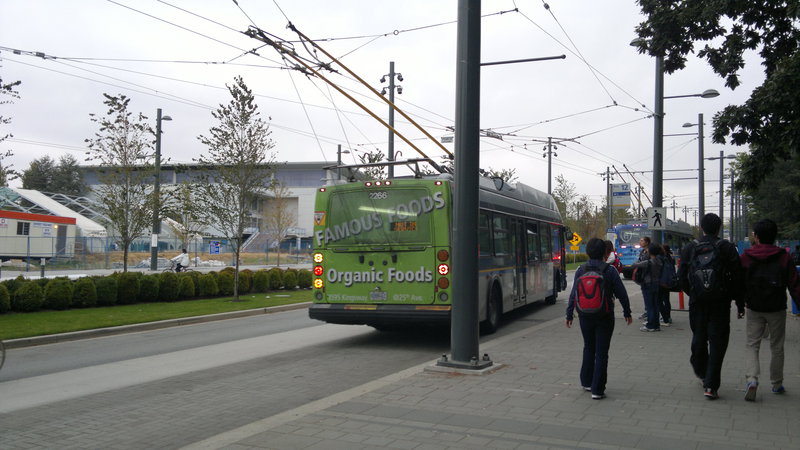
2. Dormitory and food
Dorm call it difficult. Here they use the word "Residence".
So let's see: there are several hostel complexes. In each complex there are several houses or "towers".
There are completely different types of rooms: single, double; with its own bathroom, with a bathroom on the floor, with a combined bathroom with a second room; with age limit (from 19 years), without age limit; with its own kitchen, with kitchen on the floor, without kitchen. Accordingly, prices fluctuate. I pay $ 1800 for half a year.
I was accommodated in Totem Park Residence - Kwakiutl House, a double room. In this hostel there is no age limit (I am 18 years old and I am bearded), as well as my own bathroom (it is one per floor) and kitchen (there is none at all). The bathroom is three showers, four toilet bowls and 5 sinks for 30 people. But so far I have never had to wait in line for a shower or toilet - all thanks to my schedule, but about him just below. I live in the same room with a Chinese boy who lived all his life in Canada. Pretty fun, often joking, whether we have customs control between the halves of the room.
Meals in my residence are required in the dining room. It works like this: I have a “UBC Card” - a sort of student ID card - I transfer the obligatory amount online depending on the type of food I have chosen (minimum, average, maximum), I come to the dining room with a buffet and pay for this obligatory money for having typed like a regular bank card. If suddenly the money runs out on it - you can add as much as you like. I chose the minimum type of food, put the mandatory $ 1,800 dollars and slowly eat up the money. However, you need to keep track of what you eat. There are so many expensive dishes, and one meal usually costs about $ 6- $ 10. Much cheaper to cook yourself. Breakfast I immediately replaced with cereal and milk.
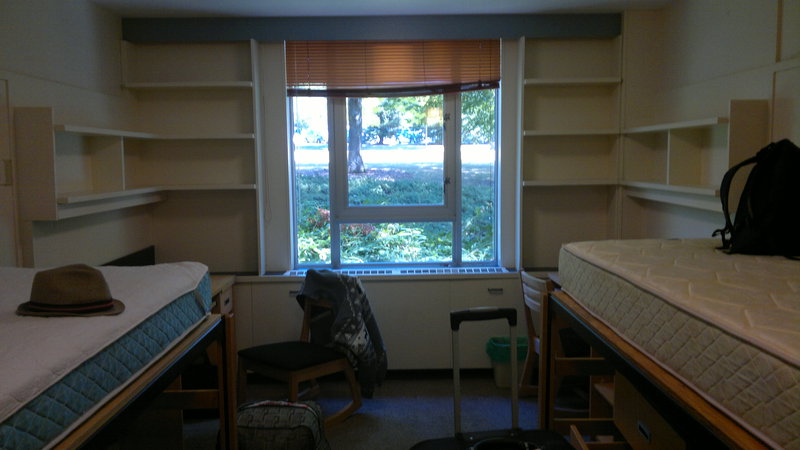
By the way, there is such a great thing - UPass. This is a travel card for students on absolutely all types of public transport. It needs to be updated once a month, just by spending its UBC Card in a special machine.
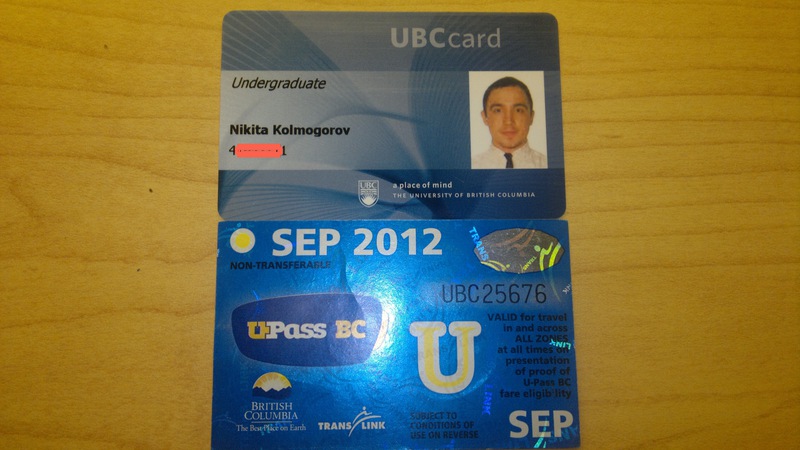
The body of the UBC is huge and sometimes you just don't have time to walk to the next lecture (lectures end 10 minutes before the next one). Therefore, I bought a bicycle.
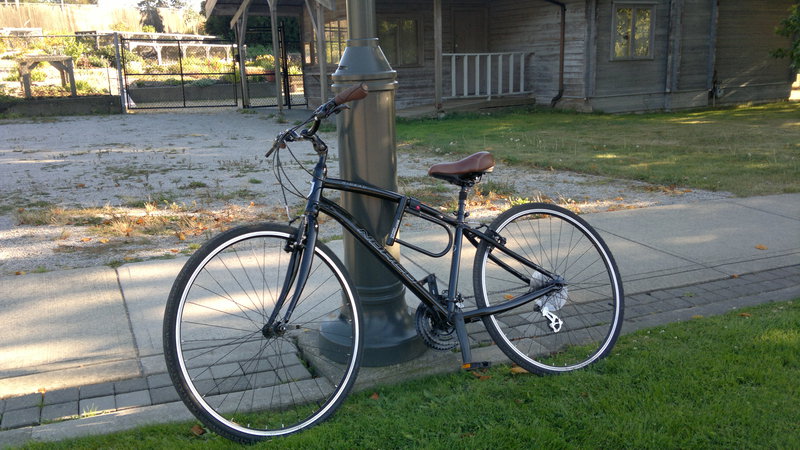
All over the building (and Vancouver in general) are located such parking:
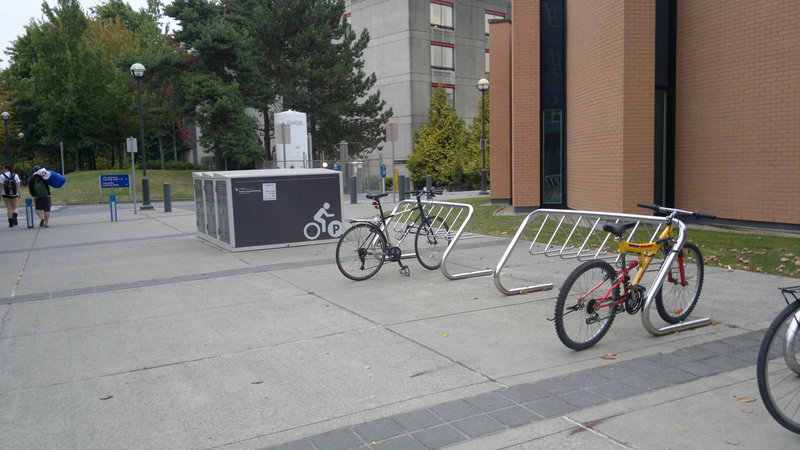
However, as a rule, parking lots at my hostel in the evening are like this:
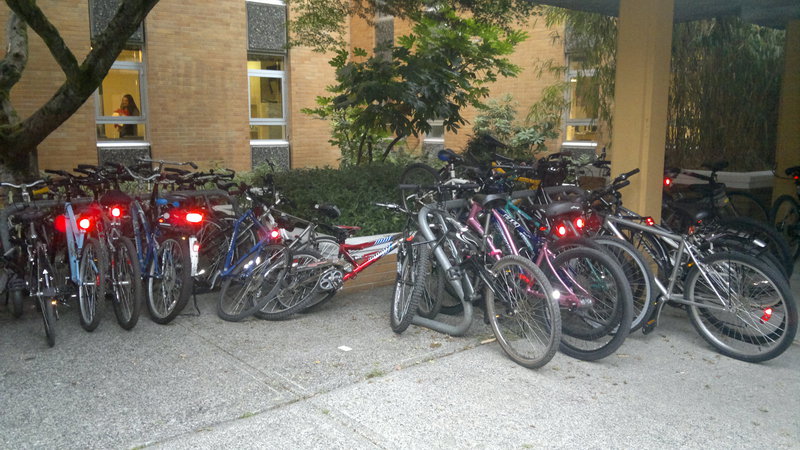
3. Study
The most probably interesting point.
In the UBC (as in any other Canadian university) operates a system of "Credits". And the money has nothing to do with it. Each course, the progress on which more than 50%, credits to your account a certain number of credits. For example, SCIE113 gives me 3 credits, and CPSC110 gives 4. In total, you need to earn from 32 to 34 credits per year. I chose all 34 credits, of which 30 were compulsory, and I got 5 subjects per semester. For each three-credit course you need to pay about $ 2,600, and for a four-credit course about $ 3,200.
There is no such thing as a “Student Group”. Everyone chooses a schedule and a set of items for himself. The exception is the first courses of Science and Arts faculties. Almost everyone can not choose a specialization in the first year - you need to teach all the subjects a little. They have such a thing as STT (Standard TimeTable) - 5 or 6 standard schedules to choose from, where everything is chosen for you.
I am in the Faculty of Science, but in Computer Science. Unofficially, we were all given a specialization in the first year. Therefore, I did not get to choose STT and I chose all the courses myself. Below I quote my schedule for the first and second half of the year.
Tip: choose courses as soon as you get the chance (around July). I began to choose in late July and at first did not get on many courses. Already on arrival, I figured everything out and now I am registered in the right number of items.

In the second half of the year, I took CPSC 210 (the subject of the second year) in order to go to practice in summer 2014. The practice here is called "CO-OP". It implies that the whole semester (in my case, summer) you do not study, but work, gaining experience. No credits are earned. It's a pity.
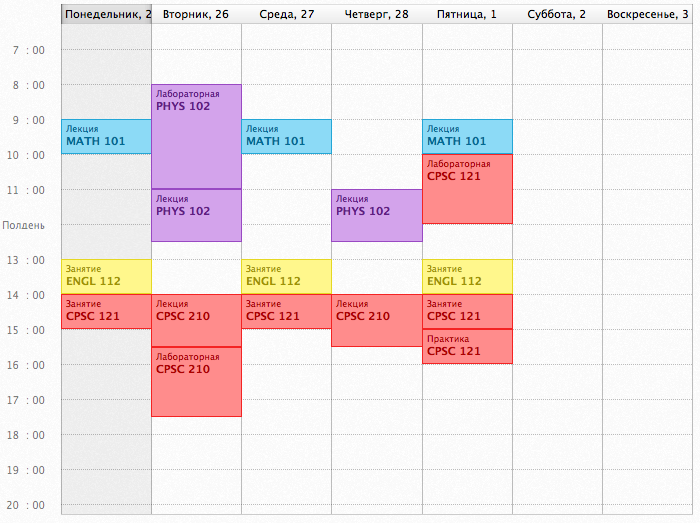
The teachers are all cheerful, friendly, friendly. All have 2-3 assistants who have their own student admission hours. If something is not clear, you can simply come to them and explain everything clearly to you. Sometimes it is difficult to learn, especially when it comes to physical terms. I constantly have to go to the dictionary: well, they did not teach us how the “Density” will be in English.
Professor of mathematics is quite an interesting person - Dragos Ghioca (I recommend to google). He has a strong Russian accent. Teachers often joke (without going beyond the scope of the lecture, of course). In general, maintain a friendly atmosphere in the classroom> 200 people.
At CPSC110 (Computer Science), we are still working with the “Dr. Racket. After the fourth year, as far as I know, graduates learn C, C ++ and Java.
The lectures are very widely used iClicker'y . Such consoles voting, as in "Who wants to be a millionaire." The educational process is deeply integrated into the Internet. Homework, quizzes, essays - all on the Internet, and almost all through one service - Connect UBC.
Below are the photos of the lecture material MATH100, CPSC110, PHYS101:
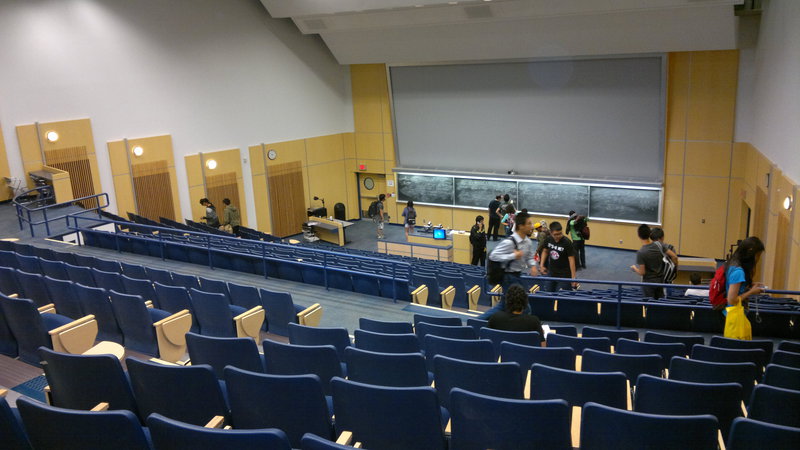
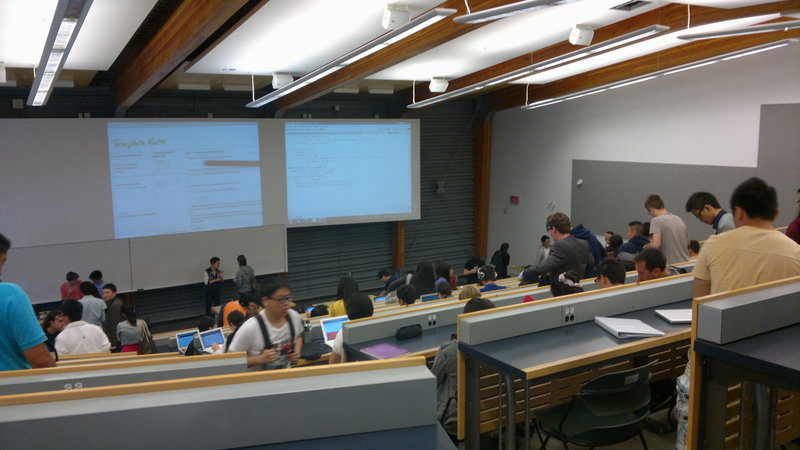
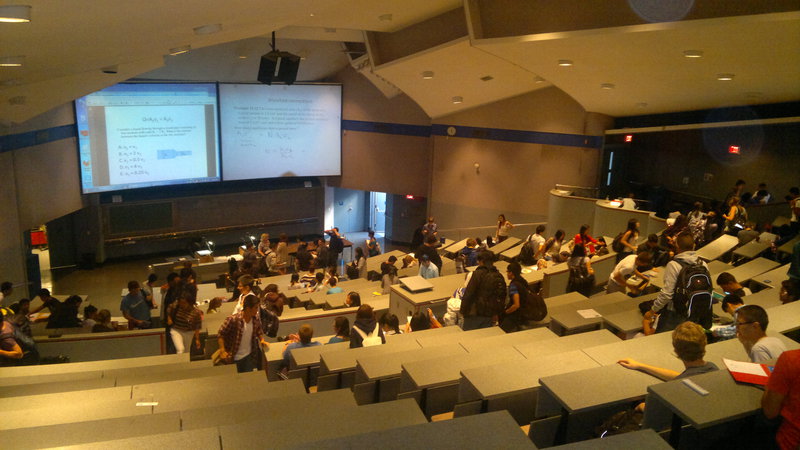
Homework, however, very much. But who said that learning is easy?
4. Entertainment
Have fun in UBC know how! Personally, I think that one who knows how to work well should be able to rest well. Without a rest from this amount of knowledge and the roof can go (sorry for my French).
The first event I went to was Imagine Day. Something like campus orientation. First a long tour, free lunch and a huge event at the end! Video attached:
If there are not enough simple parties (which are almost always here - at least every 3 days go), then you can join the student Greek society (Fraternity). Personally, I decided to join DKE (popularly referred to simply as Deke) - Delta Kappa Epsilon. They really know how to make good parties.

But it’s not only the life of booze that turns Greek life. The lion's share of time is spent on studies, sports, and charity.
For example, today one of the fraternities arranged a fundraiser for children from the Hospital of British Columbia. They took out their two cars and allowed each of them to hit 2 times on them with a sledgehammer for $ 5. Photo of cars after the fun just below:
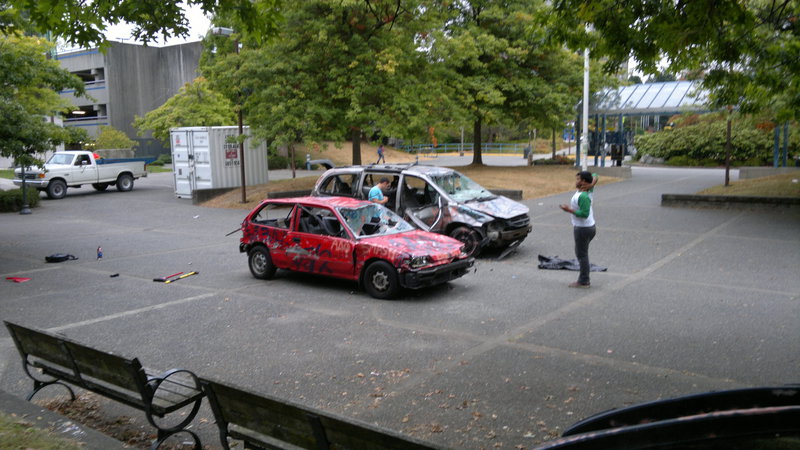
And I participated in between lectures. After all, charity is so much fun in BC! Video below:
5. Conclusion
Thank you for reading to the end!
That's how I spent my first two weeks in Canada. Most likely missed a couple of important points. Feel free to ask in the comments! I will answer all your questions!
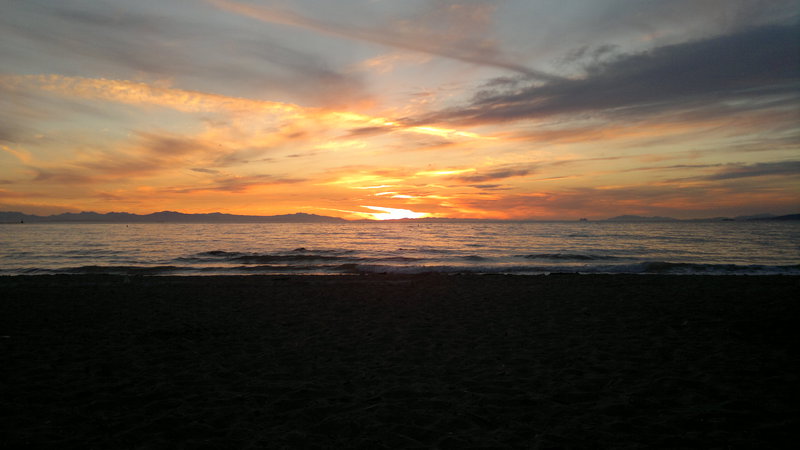
Source: https://habr.com/ru/post/151966/
All Articles